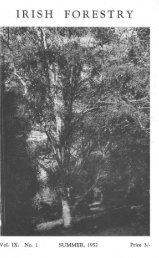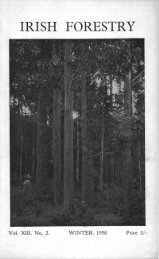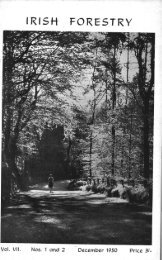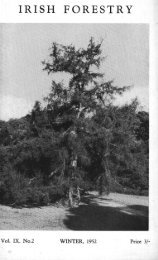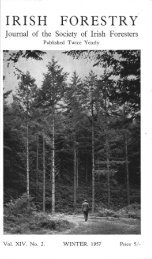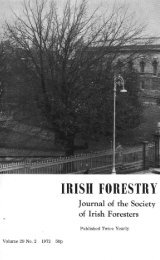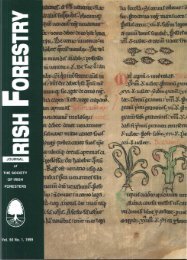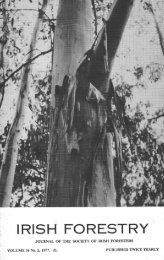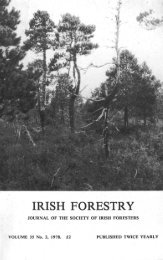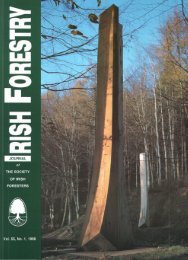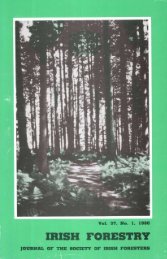Download Full PDF - 17.54 MB - The Society of Irish Foresters
Download Full PDF - 17.54 MB - The Society of Irish Foresters
Download Full PDF - 17.54 MB - The Society of Irish Foresters
Create successful ePaper yourself
Turn your PDF publications into a flip-book with our unique Google optimized e-Paper software.
25<br />
necessary powers to spend their own money on establishing their own<br />
forests would be welcomed by local authorities.<br />
He suggested that a forestry scheme could be run in conjunction<br />
with drainage schemes, while the nursery problem might be tackled<br />
by the Vocational Schools. It would be necessary however, to educate<br />
and foster a spirit <strong>of</strong> forest consciousness in the public before such a<br />
scheme could hope to succeed.<br />
Mr. Litton.<br />
<strong>The</strong> next speaker, Mr. Litton, gave his views as a farmer on the<br />
position <strong>of</strong> forestry in the national life. Farming and trees, he said,<br />
had much in common, but he would not agree with forestry experts<br />
dictating to the farmer, who really knew his own business best. He<br />
had seen a slogan that the "onus <strong>of</strong> tree planting lies with the farmer"<br />
but he did not take that seriously as he believed it was put out by<br />
nurserymen. He had also heard that trees would improve the climate<br />
but he considered that the climate did not need improving: we had,<br />
he thought, one <strong>of</strong> the best climates in the world. Again he had heard<br />
that trees beautify the countryside and induce more tourists to come<br />
here, but this he called a fantastic idea. If it was going to draw more<br />
tourists he certainly did not want it. <strong>The</strong>re was nothing more distressing<br />
to him than gates left open, crops ruined, and plantations burned<br />
by careless tourists brought here because we had beautified the countryside.<br />
Trees for shelter were, he said, the farmer's own business and<br />
the farmer was the best judge <strong>of</strong> whether such shelter was necessary<br />
and where to put it.<br />
From the farmer's point <strong>of</strong> view, if forestry was going to take a<br />
place in the national life it must be as a commercial proposition. He<br />
thought Mr. Mooney's scheme was most undesirable. It was suggested<br />
it would cost up to 1/- in the £ on the rates and this would put the<br />
farmer out <strong>of</strong> business. Farmers already paid a heavier tax than anyone<br />
else and he considered it would be unjust to increase the rates by 1/<br />
in the £ for forestry purposes.<br />
If you want to get the farmer interested he said you must show by<br />
more than mere figures that it will pay-figures do not cut much ice<br />
with the farmer, he will move very slowly which is really the best and<br />
only way. He was not himself convinced that the proposed scheme was<br />
a paying proposition.<br />
We all want to see more trees to improve the country, he said,<br />
and in the national outlook it might be far better to have more trees<br />
on the marginal lands. In mountain farms they graze a few sheep or<br />
cattle on these lands and while the output is very low the forester says<br />
trees would pay better, you cannot convert the value <strong>of</strong> this land to<br />
the farmer in hard cash, it must be taken in relation to the whole<br />
farm. If you take this land away you upset his economy so you simply<br />
can't take it away-if he loses this high ground his farm goes 'flop'.



